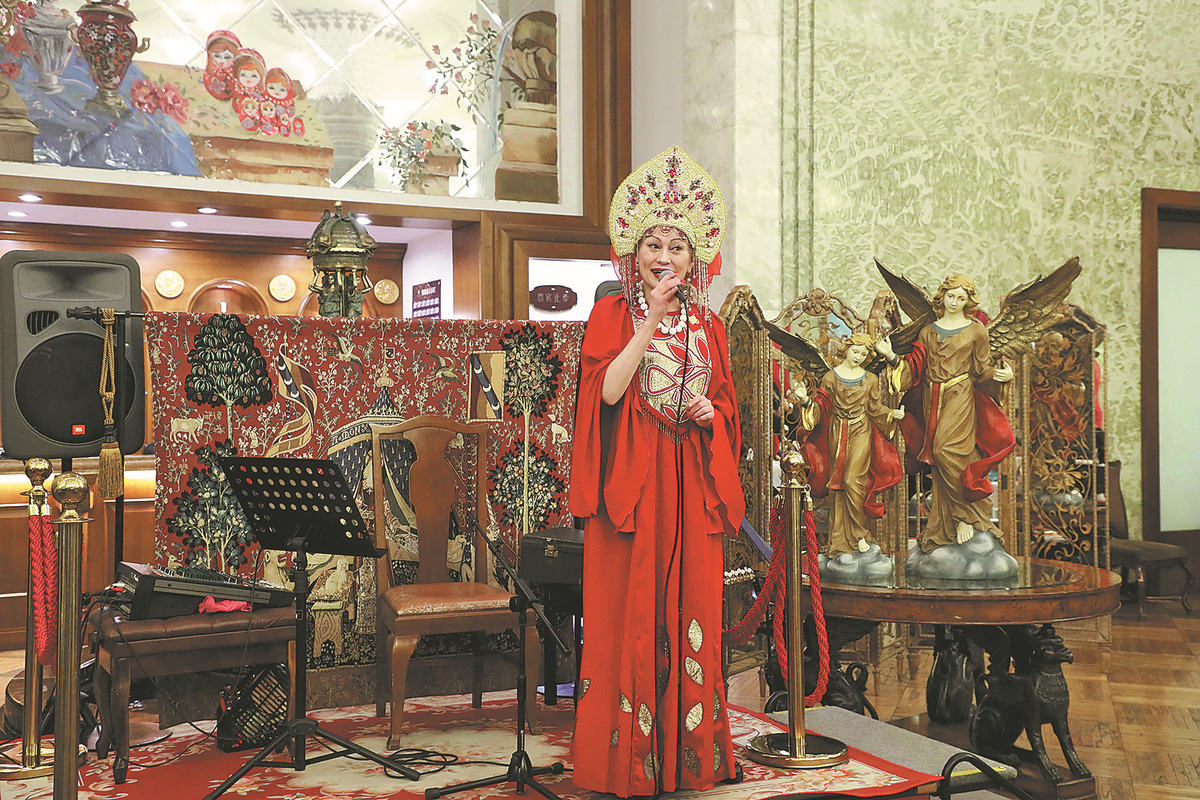Musical medley strikes right notes
By Yang Ran and Du Juan in Beijing | China Daily | Updated: 2024-10-30 09:56

When audiences start singing along with Irina Pratsyuk she truly knows her performance has hit its mark.
"That brings me immense joy," said Pratsyuk, 53, of her shows at the Moscow Restaurant in Beijing, where she has performed for 15 years. "The patrons have a deep appreciation for Russian culture, and it's heartening to see them resonate with the emotions I convey through my performances."
Pratsyuk's passion and dedication have not only made her a cherished figure at the restaurant, which many affectionately call Lao Mo, but have also attracted many Russian performers. At its peak, the show ensemble boasted nearly 20 Russian artists.
"They come to Beijing not just to perform, but to immerse themselves in Chinese culture," Pratsyuk said. "They appreciate my role in introducing them to traditional Chinese music and customs because I have lived here for many years and have developed a deep interest in the culture."
She first visited China with her family in 1995, she said. "I remember the bustling streets and the vibrant energy everywhere we went."
Ten years later, work brought her back to China, and now, nearly 20 years on, she feels she has found happiness in Beijing.
"Our regulars are like family. Many of them visit monthly, bringing their children and even grandchildren along. They love singing songs like Moscow Nights and Katyusha along with me in both Chinese and Russian, and that amazes our newer Russian performers, never having imagined Russian songs being sung in Chinese by diners."
The cultural exchange is not one-sided. Pratsyuk has also embraced Chinese culture, learning to play the ruan, a traditional Chinese string instrument. She works with local musicians, blending traditional Chinese instruments with Russian melodies, and vice versa.
"The result is magical. We sing together, helping each other grasp the essence of the songs, like one big family."
Beyond her performances at the Moscow Restaurant, she also wants to introduce Chinese culture to Moscow.
"I teach young Russian performers traditional Chinese songs, and when they return to Russia they carry a piece of China with them.
"There is a growing fascination with China among foreigners. Many Russians are learning Chinese, and with Confucius Institutes established across Russia, many Russians now can speak Chinese."
In her free time, Pratsyuk enjoys strolling in Beijing's parks, where local singers often greet her with familiar Russian tunes such as Moscow Nights.
"It's their musical gift to me. Music transcends cultural differences and brings us closer together."
This harmonious exchange is part of a larger tapestry of cultural interactions between Beijing and Moscow. Institutions such as the Central Conservatory of Music in Beijing and the Tchaikovsky Moscow State Conservatory have maintained a long-standing relationship, fostering academic exchanges and collaboration.
Many renowned professors from the Central Conservatory of Music, such as Du Mingxin, celebrated for his contributions to concertos and ballets such as The Red Detachment of Women, have pursued their studies in Moscow.
In 2017 representatives of the Tchaikovsky Conservatory visited Beijing and joined the music education alliance along the Belt and Road, further strengthening these ties.
Beyond music, the two cities enjoy vibrant exchanges in dance, painting and other cultural fields. In July 1956, the first complete classical ballet performed in China, La Fille Mal Gardee (The Wayward Daughter), directed by an expert from Moscow, premiered at the Tianqiao Theater in Beijing. Yao Xiaoli, deputy general manager of Beijing Exhibition Center Co Ltd, said dance troupes from Moscow performed in the Beijing Exhibition Theater in 1992 with seven consecutive days of ballet performances drawing full houses and enthusiastic responses from the audience.
Recently, to celebrate the 70th anniversary of the Beijing Exhibition Center, a special Russian ballet season was held in its theater hall, which was enthusiastically welcomed by Beijing audiences.
"Artistic exchange plays a crucial role in fostering mutual understanding between our cities and countries," Yao said.
"Art, as a language that transcends borders, can touch people's hearts and create resonance, paving the way for friendly interactions and shared growth."
























